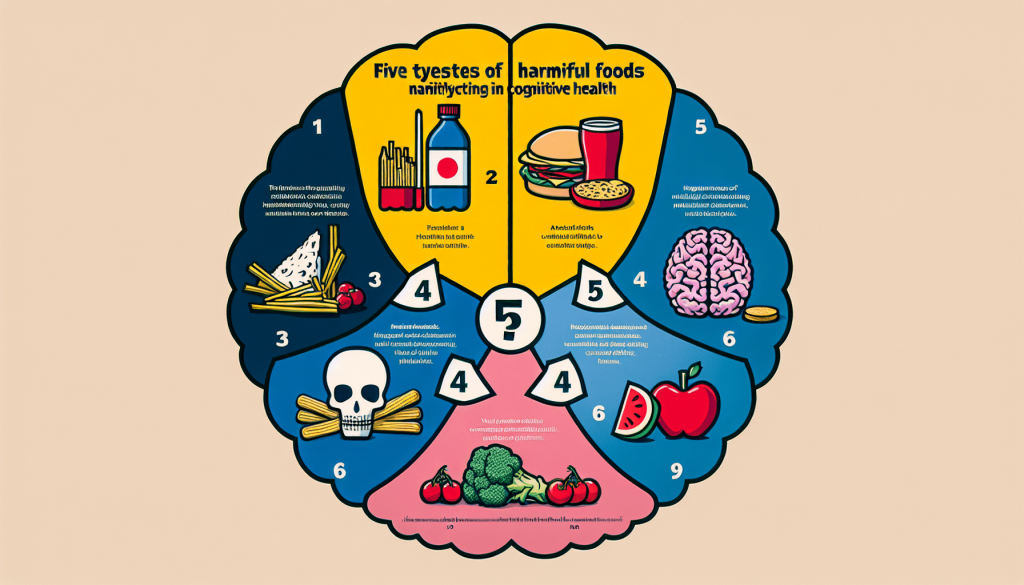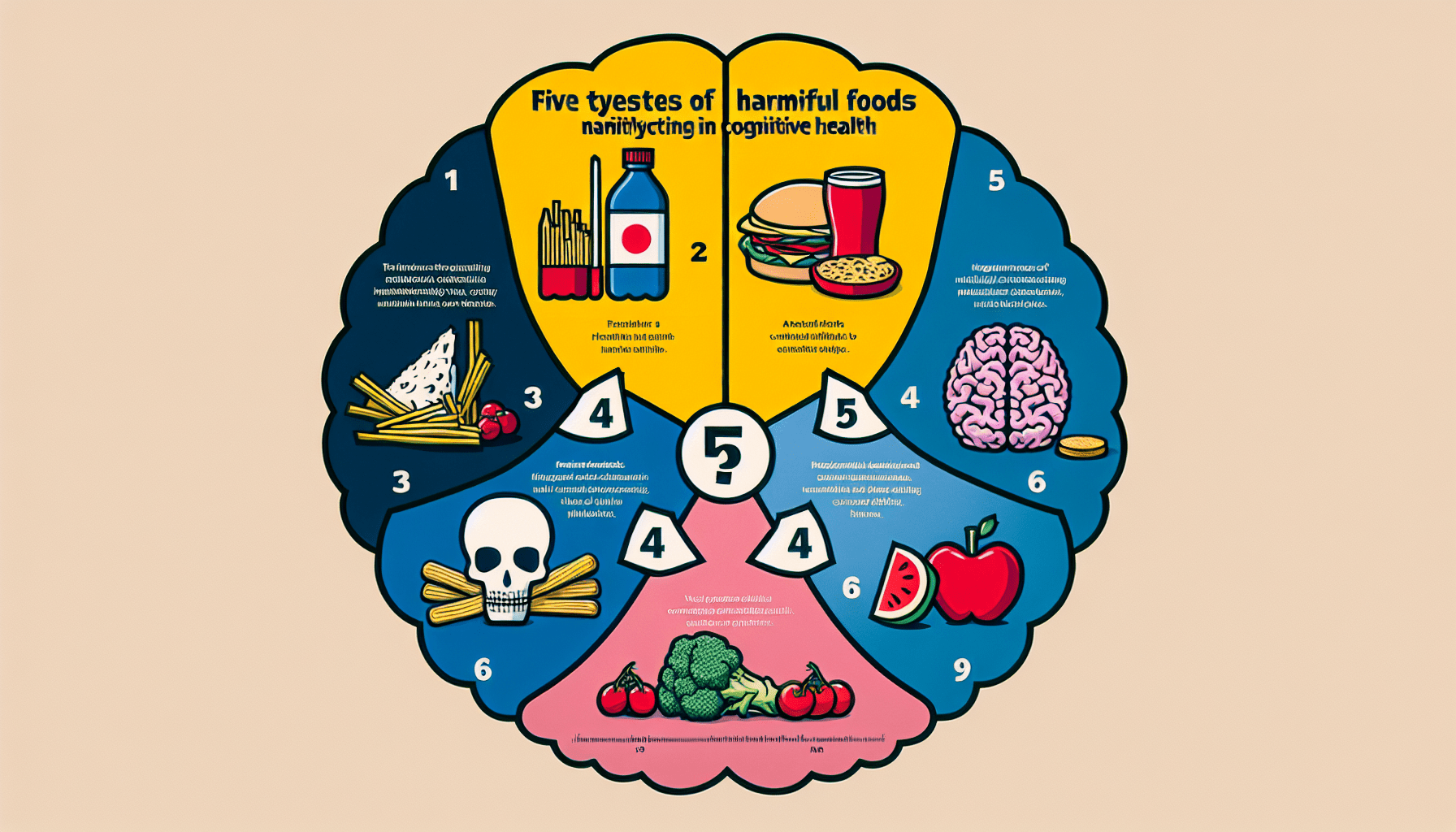What Are The 5 Brain Killer Foods?
Are you looking to improve your cognitive function and boost your brain power? Well, look no further! In this article, we will uncover the five worst culprits that are silently taking a toll on your brain health. These notorious brain killer foods might surprise you, as they are common staples in many people’s diets. So, without further ado, let’s get straight to the point and reveal the foods you should avoid if you want to keep your brain in tiptop shape.
Processed Foods
Processed foods are a common staple in many people’s diets, but they can have a negative impact on your health, particularly when it comes to your brain. These foods are typically high in added sugar, which can lead to a host of health problems, including obesity, diabetes, and even cognitive decline. Excessive consumption of processed foods can also result in an increased risk of developing certain chronic diseases. It’s important to be mindful of the ingredients in processed foods and opt for whole, unprocessed alternatives whenever possible.
High in Added Sugar
One of the major concerns with processed foods is their high sugar content. Added sugars, such as high fructose corn syrup, are commonly found in these foods and can wreak havoc on your health. Consuming excessive amounts of added sugars can lead to weight gain and an increased risk of chronic diseases such as heart disease and type 2 diabetes. Additionally, a diet high in added sugars has been linked to cognitive decline and impaired brain function. Therefore, it’s crucial to limit your intake of processed foods that contain high levels of added sugar and opt for natural, unprocessed sources of sweetness.
High in Trans Fats
Processed foods are often loaded with unhealthy fats, including trans fats. Trans fats are created during the hydrogenation process, which turns liquid oils into solid fats. These fats can raise your bad cholesterol levels and lower your good cholesterol levels, leading to an increased risk of heart disease. Furthermore, research suggests that trans fats may have a negative impact on brain health, contributing to cognitive decline and an increased risk of Alzheimer’s disease. It’s advisable to check labels carefully and avoid processed foods that contain trans fats.
Contain Artificial Ingredients
Another concern with processed foods is the presence of artificial ingredients. These ingredients are added to enhance flavor, texture, and shelf life, but they offer little to no nutritional value. Artificial additives, such as artificial sweeteners and food colorings, have been associated with various health issues, including hyperactivity, migraines, and even cancer. When it comes to brain health, these artificial ingredients may have negative effects, such as impaired brain function and increased cravings for unhealthy foods. To protect your brain health, it’s best to steer clear of processed foods that contain artificial ingredients and focus on consuming natural, whole foods instead.
Sugary Drinks
While it’s widely known that sugary drinks can contribute to weight gain and an increased risk of chronic diseases, their negative effects on brain health are often overlooked. Sugary drinks are typically loaded with high fructose corn syrup, which is a highly processed form of sugar. This form of sugar can negatively impact the brain, leading to impaired memory and learning abilities. Moreover, excessive consumption of sugary drinks has been linked to an increased risk of Alzheimer’s disease and dementia. It’s crucial to be aware of the hidden sugars in beverages and opt for healthier alternatives like water, unsweetened tea, or homemade fruit-infused drinks.
High Fructose Corn Syrup
High fructose corn syrup is a common ingredient found in sugary drinks. This type of sugar is highly processed and has been linked to various health issues, including obesity, type 2 diabetes, and non-alcoholic fatty liver disease. When it comes to brain health, high fructose corn syrup can have a negative impact. Research suggests that excessive consumption of this sweetener can lead to impaired memory and cognitive decline. Therefore, it’s important to choose beverages that are free from high fructose corn syrup and opt for natural, healthier alternatives.
Artificial Sweeteners
Many people turn to artificial sweeteners as a calorie-free alternative to sugar. However, these artificial sweeteners may come with their own set of negative health effects, particularly when it comes to brain health. There is evidence to suggest that artificial sweeteners can disrupt the brain’s reward system and lead to increased cravings for sweet foods. Additionally, research has linked artificial sweeteners to impaired gut microbiota, which can have consequences on overall health, including brain function. It’s recommended to limit the consumption of sugary drinks and opt for beverages that are free from both added sugars and artificial sweeteners.
Negative Effects on Brain
The consumption of sugary drinks has been shown to have negative effects on brain health. Excessive intake of these beverages has been associated with cognitive decline, poor memory, and an increased risk of neurodegenerative diseases such as Alzheimer’s disease. The high sugar content in sugary drinks can lead to chronic inflammation and oxidative stress in the brain, which contribute to cognitive impairment. It’s crucial to be mindful of your intake of sugary drinks and prioritize beverages that promote brain health, such as water or herbal tea.

Fast Food
Fast food has become a ubiquitous part of modern society due to its convenience and affordability. However, indulging in fast food on a regular basis can have detrimental effects on both your physical health and brain function. These foods are often high in saturated fats, sodium, and low in essential nutrients, making them a poor choice for overall health and well-being.
High in Saturated Fats
Fast food is notorious for being high in saturated fats. These unhealthy fats can raise your bad cholesterol levels and increase your risk of heart disease and stroke. When it comes to brain health, a diet high in saturated fats has been linked to cognitive decline and an increased risk of dementia. Therefore, it’s important to limit your consumption of fast food and opt for healthier options that are lower in saturated fats.
High in Sodium
Fast food is typically loaded with sodium, which can have negative consequences for your health. Excessive sodium intake can lead to high blood pressure, putting a strain on your cardiovascular system and increasing your risk of heart disease. In terms of brain health, a diet high in sodium has been associated with cognitive decline and an increased risk of stroke. It’s crucial to be mindful of your sodium intake and choose lower-sodium options whenever possible.
Low in Essential Nutrients
Fast food is often lacking in essential nutrients that are important for overall health, including brain health. These foods are typically low in vitamins, minerals, and fiber, while being high in calories, unhealthy fats, and added sugars. This lack of essential nutrients can lead to nutritional deficiencies and adversely affect brain function. To promote brain health, it’s important to focus on a diet rich in whole, unprocessed foods that provide the necessary nutrients for optimal brain function.
Fried Foods
Fried foods may be delicious, but they can be harmful to your brain health. These foods are often high in trans fats, which are created when oils are heated to very high temperatures. Trans fats are known to raise bad cholesterol levels and increase the risk of heart disease. When it comes to brain health, there is evidence to suggest that a diet high in trans fats can contribute to cognitive decline and an increased risk of Alzheimer’s disease.
High in Trans Fats
Trans fats, commonly found in fried foods, have been shown to have detrimental effects on both physical and mental health. These unhealthy fats can raise your bad cholesterol levels and lower your good cholesterol levels, increasing your risk of heart disease and stroke. In terms of brain health, a diet high in trans fats has been linked to cognitive decline and an increased risk of neurodegenerative diseases. To protect your brain health, it’s best to limit your intake of fried foods and opt for healthier cooking methods such as baking, grilling, or steaming.
Linked to Cognitive Decline
Research has consistently shown a link between the consumption of fried foods and cognitive decline. The high levels of unhealthy fats found in these foods can lead to chronic inflammation and oxidative stress, both of which contribute to cognitive impairment. Furthermore, a study published in the American Journal of Epidemiology found that a diet high in fried foods was associated with an increased risk of developing Alzheimer’s disease. It’s important to be mindful of your consumption of fried foods and prioritize brain-healthy alternatives.
Contributing to Inflammation
The consumption of fried foods has been shown to contribute to chronic inflammation in the body. Chronic inflammation is believed to be a major contributor to various health issues, including heart disease, obesity, and cognitive decline. Inflammation in the brain can lead to neuronal damage and impaired cognitive function. By reducing your intake of fried foods and opting for foods that promote an anti-inflammatory response in the body, you can protect your brain health and overall well-being.

Processed Meats
Processed meats are a popular choice for many people due to their convenience and flavor. However, these meats are often packed with harmful additives and high levels of sodium, making them a questionable choice for brain health. It’s important to be aware of the potential dangers associated with processed meats and prioritize healthier alternatives.
Sodium Nitrite
One of the major concerns with processed meats is the presence of sodium nitrite. This additive is used to enhance the color and flavor of meats but has been linked to various health issues, including an increased risk of cancer. High levels of sodium nitrite in processed meats can also contribute to the formation of harmful compounds called nitrosamines, which have been associated with adverse effects on brain health. To protect your brain health, it’s advisable to limit your consumption of processed meats and select fresh, unprocessed meats instead.
Saturated Fats
Processed meats are often high in unhealthy saturated fats. These fats can raise your bad cholesterol levels and increase your risk of heart disease and stroke. Additionally, research has shown that a diet high in saturated fats may impair brain function and increase the risk of cognitive decline. To promote brain health, it’s important to choose lean proteins and limit your intake of processed meats that are high in saturated fats.
Harmful Additives
Processed meats are typically loaded with various additives and preservatives to extend their shelf life and enhance their flavor. However, these additives can have detrimental effects on your health, including brain health. For example, a common additive in processed meats is monosodium glutamate (MSG), which has been associated with headaches, migraines, and cognitive issues. It’s important to read labels carefully and opt for fresh, unprocessed meats that do not contain harmful additives.
Artificial Sweeteners
Artificial sweeteners are commonly used as sugar substitutes in various beverages and food products. While they may seem like a healthier alternative to sugar, there are concerns about their impact on brain function and overall health. It’s important to be aware of the potential negative effects of artificial sweeteners and make informed choices when it comes to selecting sweeteners for your diet.
Negative Impact on Brain Function
Research has suggested that artificial sweeteners can have a negative impact on brain function. Animal studies have shown that artificial sweeteners can disrupt the brain’s reward system, leading to increased cravings for sweet foods and potentially resulting in overeating and weight gain. Furthermore, artificial sweeteners have been associated with impaired memory and cognitive decline in both animal and human studies. It’s advisable to limit your consumption of artificial sweeteners and opt for natural sweeteners such as stevia or honey when needed.
Linked to Increased Cravings
One major concern with artificial sweeteners is their potential to increase cravings for sweet foods. By having a taste that is much sweeter than regular sugar, artificial sweeteners can alter the brain’s response to sweetness, potentially leading to a heightened desire for sugary foods. These increased cravings can contribute to overeating and weight gain, affecting both physical and brain health. When possible, it’s best to choose naturally sweetened alternatives or enjoy sweets in moderation.
Impaired Gut Microbiota
Artificial sweeteners have also been shown to negatively impact the gut microbiota, which plays a crucial role in overall health, including brain health. Animal studies have found that artificial sweeteners can disrupt the balance of beneficial bacteria in the gut, leading to a less diverse and less healthy gut microbiota. This imbalance has been associated with various health issues, including impaired brain function and increased risk of metabolic disorders. To support a healthy gut microbiota and promote brain health, it’s advisable to limit your intake of artificial sweeteners.
Highly Refined Grains
Highly refined grains, such as white flour and white rice, have been stripped of their fiber and nutrients, leaving behind a product that offers little to no nutritional value. These grains can have negative effects on both physical and brain health, and it’s important to choose healthier alternatives whenever possible.

Lack of Nutrients
Highly refined grains lack the nutrients found in whole grains, such as fiber, vitamins, and minerals. The refining process removes the bran and germ of the grain, where many of the beneficial nutrients are found. This lack of nutrients can lead to deficiencies and negatively affect brain function. To support brain health, it’s best to opt for whole grains, such as whole wheat bread or brown rice, which provide a greater range of nutrients.
Spikes in Blood Sugar
Highly refined grains have a high glycemic index, meaning they can lead to a rapid increase in blood sugar levels after consumption. This rapid rise in blood sugar can trigger a release of insulin, which helps regulate blood sugar levels. However, repeated spikes in blood sugar can disrupt the delicate balance of insulin in the body and potentially contribute to insulin resistance, a condition that is associated with an increased risk of type 2 diabetes and cognitive decline. By choosing whole grains with a lower glycemic index, you can help maintain more stable blood sugar levels and support your brain health.
Negative Effects on Cognition
Research suggests that a diet high in highly refined grains may have negative effects on cognition. One study published in the journal Nutritional Neuroscience found that a diet high in refined grains was associated with poorer cognitive performance, including reduced attention and memory function. Conversely, diets rich in whole grains have been linked to better cognitive function and a reduced risk of age-related cognitive decline. To support brain health, it’s important to choose whole grains over highly refined grains whenever possible.
High Mercury Fish
Fish is often hailed as a healthy food choice due to its high levels of omega-3 fatty acids. However, it’s important to be mindful of the mercury content in certain fish, as high mercury levels can have detrimental effects on brain health, particularly in vulnerable populations such as pregnant women, infants, and young children.

Mercury Neurotoxicity
Mercury is a highly toxic heavy metal that can have neurotoxic effects on the brain. When consumed in high levels, mercury can impair brain development and function, particularly in developing fetuses and young children. Pregnant women and nursing mothers should be especially cautious when consuming fish with high mercury levels to protect their own health as well as the health of their babies. It’s best to choose fish that are low in mercury, such as salmon, sardines, or trout, and limit your intake of high mercury fish like shark, swordfish, and king mackerel.
Impaired Brain Development
Exposure to high levels of mercury during pregnancy can have serious consequences for fetal brain development. Mercury can interfere with the formation of neural pathways and disrupt the normal functioning of the developing brain. This can potentially lead to cognitive and behavioral problems later in life. To ensure healthy brain development in infants, pregnant or nursing women should avoid high mercury fish and instead focus on consuming low mercury fish that provide essential nutrients for brain health.
Potential Cognitive Decline
In addition to its impact on developing brains, high mercury levels in adults can also contribute to cognitive decline. Studies have suggested that prolonged exposure to mercury, even at low levels, may increase the risk of cognitive impairment and neurodegenerative diseases such as Alzheimer’s disease. To protect your brain health, it’s advisable to choose fish with low mercury levels and consume them in moderation as part of a varied and balanced diet.
Alcohol
While moderate alcohol consumption has been associated with certain health benefits, excessive or habitual drinking can have serious consequences for both physical and brain health. It’s important to be mindful of your alcohol consumption and understand its potential negative effects.
Neurotoxic Effects
Alcohol is a neurotoxin that can have damaging effects on brain cells and the overall structure of the brain. Prolonged and excessive alcohol consumption can result in brain shrinkage and cognitive impairment. Specifically, alcohol can affect the prefrontal cortex, which is responsible for decision-making, inhibition, and impulse control. This can impair cognitive function and lead to difficulties in attention, memory, and problem-solving. To protect your brain health, it’s advisable to limit your alcohol consumption to moderate levels or avoid it altogether.
Impaired Brain Function
Alcohol can have immediate and long-term effects on brain function. Even a single episode of heavy drinking can result in impaired judgment, memory blackouts, and poor decision-making. Long-term alcohol abuse can lead to chronic cognitive impairment, difficulty with learning and memory, and an increased risk of neurodegenerative diseases such as dementia. It’s crucial to be mindful of your alcohol intake and prioritize brain-healthy habits.
Increased Risk of Dementia
Chronic alcohol abuse has been shown to increase the risk of developing dementia, a group of neurodegenerative diseases characterized by cognitive decline and memory loss. Alcohol-related dementia can have serious long-term consequences for brain health and overall quality of life. To protect your brain health and reduce the risk of dementia, it’s important to moderate your alcohol consumption or seek help if you are struggling with alcohol abuse.
Artificial Food Additives
Artificial food additives are substances that are added to processed foods to enhance flavor, texture, color, and shelf-life. While they may make food more appealing, there are concerns about their impact on brain health and overall well-being. It’s essential to understand the potential negative effects of these additives and make informed choices about the foods you consume.
Excitotoxicity
Some artificial food additives, such as monosodium glutamate (MSG), can have excitotoxic effects on the brain. Excitotoxicity occurs when there is an excessive release of glutamate, an excitatory neurotransmitter. This can lead to overstimulation of brain cells and subsequent cell damage or death. Research has linked excitotoxicity to various neurodegenerative diseases, including Alzheimer’s disease and Parkinson’s disease. To protect your brain health, it’s advisable to limit your consumption of foods that contain artificial additives known to have excitotoxic effects.
Inflammation
Artificial food additives, particularly those that are artificial colors or flavors, may contribute to inflammation in the body. Inflammation is a natural response of the immune system, but chronic inflammation can lead to a range of health issues, including brain function impairment. Inflammation in the brain has been linked to cognitive decline, mood disorders, and neurodegenerative diseases. To support brain health, it’s best to choose foods that are free from artificial additives and opt for natural, unprocessed alternatives.
Negative Effects on Brain Health
The consumption of artificial food additives has been associated with negative effects on brain health. Some studies have suggested that these additives may contribute to cognitive impairments, including reduced attention and memory function. Moreover, certain additives, such as aspartame, have been linked to headaches and migraines in susceptible individuals. It’s important to be aware of the potential negative effects of artificial food additives and choose foods that are free from these substances whenever possible.
In conclusion, it’s essential to be mindful of the impact of certain foods and additives on brain health. Processed foods, sugary drinks, fast food, fried foods, processed meats, artificial sweeteners, highly refined grains, high mercury fish, alcohol, and artificial food additives can all have negative effects on brain function and overall well-being. By prioritizing a diet rich in whole, nutrient-dense foods and limiting your consumption of these brain killer foods, you can promote optimal brain health and support your overall cognitive function. Remember, small changes in your diet can have a big impact on your brain health, so choose wisely and take care of your brain for a lifetime of wellness.
Additional Resources

My heart froze as I watched a video explaining how brilliant scientists managed to revoke Alzheimer, dementia and 3 other types of brain diseases in 100% of cases.
It was the biggest trial ever run on 7,000 people, from mild to severe memory loss disease. You can check their findings here.
It took them 4 years and a lot of sweat and blood but in the end they actually discovered the real root cause of brain damage and why diseases like Alzheimer and dementia happen to millions these days.







